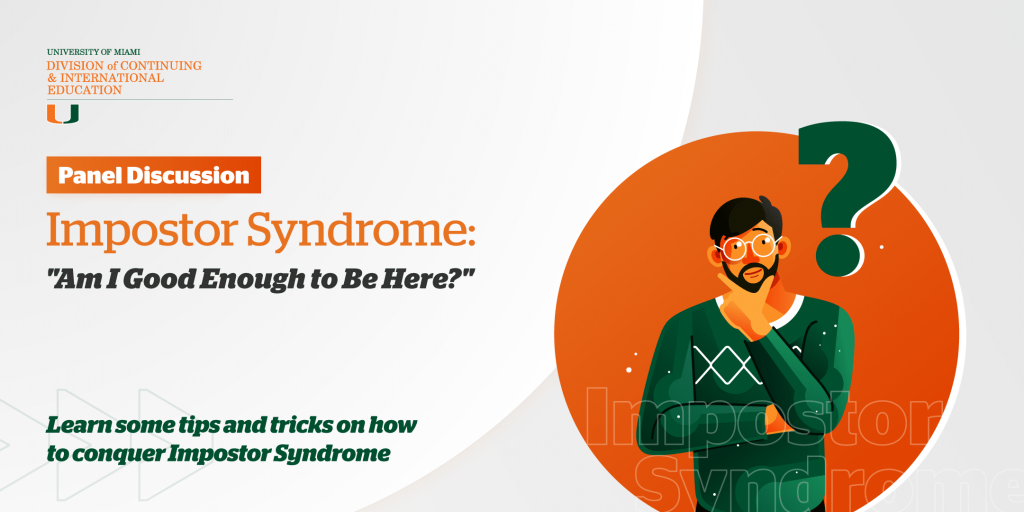- Resources
- What is Impostor Syndrome?
- Why is It so Common?
- How to Recognize it
- What Can You Do About It?
Have ever doubted whether you achieved something not because you are qualified or talented or a hard worker, but because of sheer luck? Are you unsure if you truly belong in your position?
Then you may have experienced what the experts call “impostor syndrome”.
While the motto “fake it till you make it” has become a quintessential motivational quote for a majority of today’s workforce, many young professionals often experience anxiety and negative feelings around a primal fear of being exposed as frauds—specifically for not measuring up to their jobs or academic positions.
In our recent panel “Am I Good Enough to Be Here?” panelists shared their favorite podcasts, books, and videos they use to gain clarity, learn something new, and quiet the uneasy feeling of impostor syndrome.
Whether you’re a small business owner, a corporate newbie, or you want more out of the content you consume, this curated collection is sure to get you through the workweek.
Resources
Books 📚
Lean In by Sheryl Sandberg
Option B by Sheryl Sandberg and Adam Grant
The Gutsy Girl Handbook by Kate White
Crushing It!: How Great Entrepreneurs Build Their Business and Influence by Gary Vaynerchuk
The Happiness Advantage by Shawn Achor
Big Magic by Elizabeth GIlbert
The Power of Habit by Charles Duhigg
The Happiness Advantage by Shawn Achor
I Thought It Was Just Me (but it isn’t): Telling the Truth about Perfectionism, Inadequacy, and Power by Brené Brown
Think Again by Adam Grant (Chapter on Impostor Syndrome)
Podcasts 🎧
Entrepreneur Motivation Podcast with Chris Bello
Smart Passive Income with Pat Flynn
Savvy Social Podcast with Andréa Jones
Side Hustle Pro with Nicaila Matthews
Online Marketing Made Easy with Amy Porterfield
Lead From the Heart with Mark C. Crowley
TEDTalks📺
The Happiness Advantage: Linking Positive Brains to Performance – Shawn Achor
5 Second Rule – Mel Robbins

What Is Impostor Syndrome?
Though it is not a recognized condition in the DSM, impostor syndrome as we know it has been recognized by psychologists since the 1970s.
Impostor syndrome is a very specific form of self-doubt that normally afflicts high-achievers or people who grew up in families that placed a big emphasis on achievement.
Why Is It So Common?
While there is no specific evidence pointing to a higher rate of impostor syndrome among any specific demographic, Millennials are uniquely positioned to be most vulnerable to its effects. Once known as “Generation Stress,” most millennials were raised by parents with the bad habit of oscillating between over-praise and criticism. According to the American Psychological Association, this behavior can increase the risk of fraudulent feelings in young adults.
The myth of the college drop-out billionaire rose to popularity in the past few decades, fueled by hyped-up lists of 30-under-30 overachievers. It is not easy to take your achievements seriously when our society defines “success” as having founded a unicorn startup in your early 20s.
The fact is, many of us have perfectly adequate careers, but no salaried position can possibly measure up to the ideal of the visionary entrepreneur, leaving us with the empty feeling that our achievements—as impressive and noteworthy as they might be—are not deserving of celebration and recognition.
Plus, we never get a chance to stop comparing ourselves to the gods of social media and reality TV. Beauty filters and retouching software create unattainable standards for what our bodies should look like, while celebrities and influencers render lavish, extravagant lifestyles the norm.
These fabricated standards set up Millennials and Gen Z to establish unrealistically high goals for their personal and professional lives based on standards that don’t translate into the real world.
How Can You Recognize It?
Because of their fear of being exposed as frauds, people whose mental health is affected by impostor syndrome are unlikely to talk about it or reach out for help—but you can learn to recognize the signs that you or someone around you might be feeling like a hoax.
One of the most common tell-tale signs is perfectionism. Impostors feel a very real need to demonstrate that they can perform tasks flawlessly, but because of the crushing amount of pressure they put on themselves, they often end up chronically procrastinating or wasting enormous amounts of time over-preparing.

Mental Health Implications
Researchers have noticed a correlation between social anxiety and impostor syndrome, but non-apprehensive people can also experience anxiety if they find themselves in situations where they feel inadequate or unprepared.
Impostor syndrome is likely to create a vicious cycle that begins with a lack of self-confidence and leads to an inability to take credit for your own achievements. This leads to beliefs of being a fraud and feelings of anxiety or shame, which can result in overworking and feeling undeserving of praise or recognition.
The cycle continues until the anxiety and negative feelings spiral out, and, if ignored, this dynamic can worsen anxiety and may lead to full-blown depression.
What Can You Do About It?
Can you relate to feeling impostor syndrome?
Impostor syndrome is more common than you think! This is a very manageable concern, with roughly 70% of people experiencing it at least once in their lifetime.
The most beneficial first step is to share your feelings and avoid becoming isolated, whether you decide to seek help from a mental health professional, a family member, or a colleague. On the other hand, if you think someone close to you might be experiencing impostor syndrome, try to make sure they don’t isolate themselves from others. You can also try to help them develop a more realistic perspective on their abilities and competence through honest feedback.
The goal is for the “impostor” to stop seeing themselves as unworthy of praise, and to be able to internalize their experiences of success. There are a few simple things that anybody can do to help this process along: some people find that keeping a record of positive feedback from others can help, while others prefer recalling past successes or making a point of celebrating current achievements.
Curious to learn more about imposter syndrome and how to combat it? Click to watch the full panel discussion and share your thoughts!



